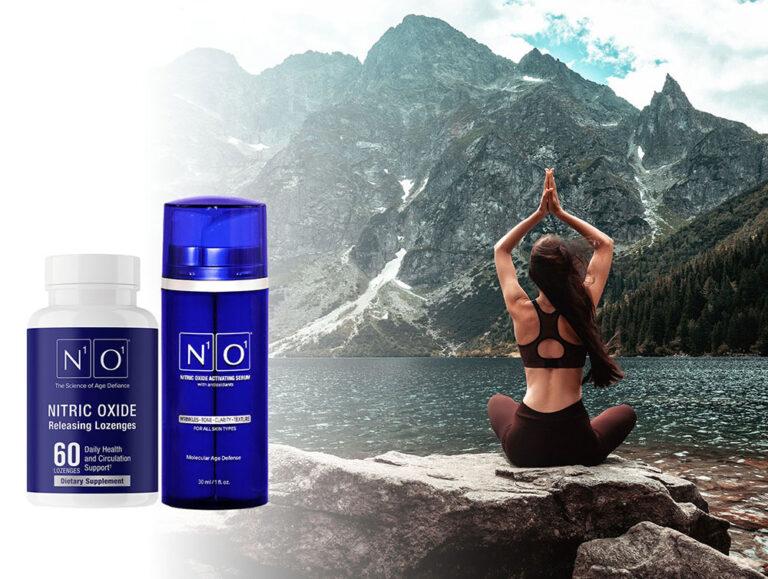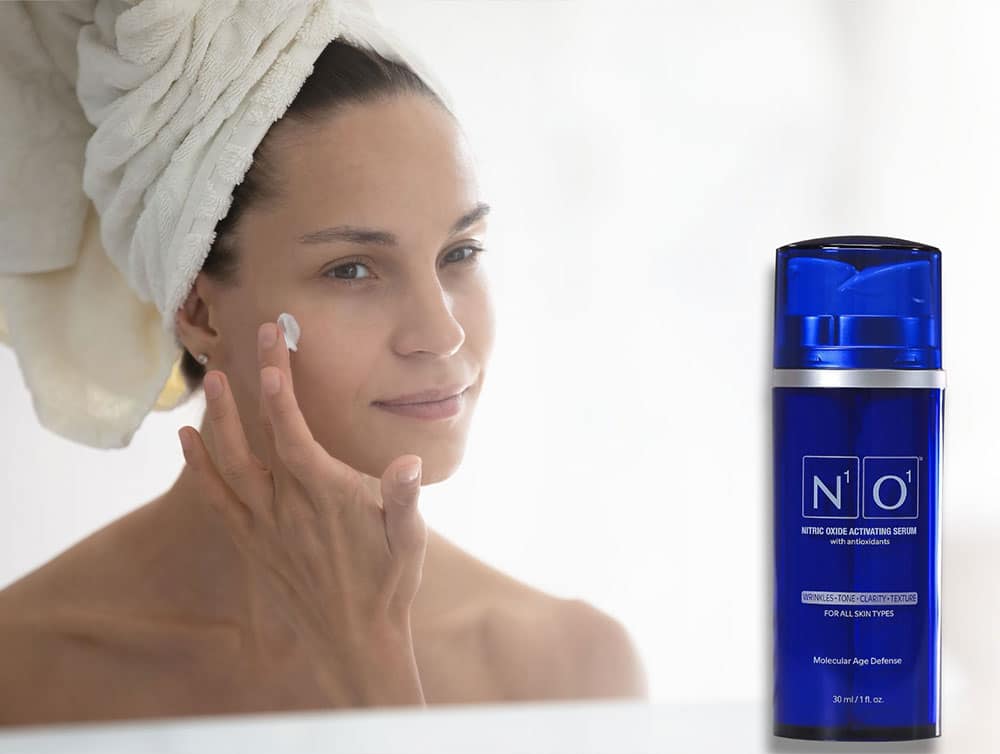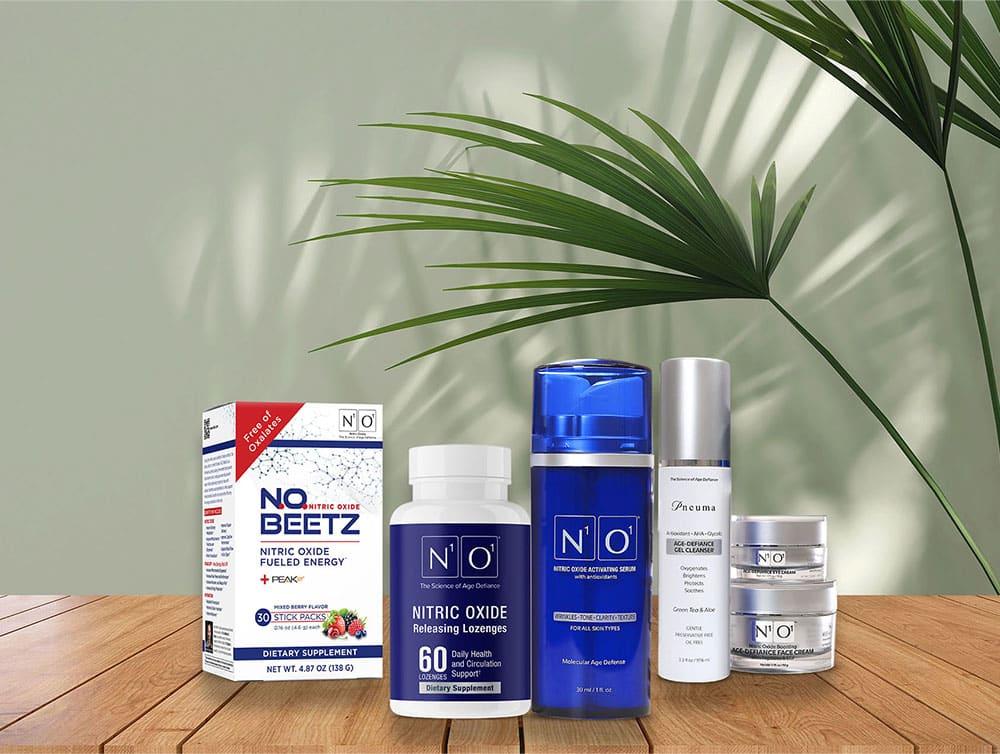
Nitric oxide products have become increasingly popular over the past 20 years. In fact, if you throw a search for nitric oxide supplements into Google, you’ll get over 35 million results in just 1.08 seconds.
But do any of these products actually work?
With every label claiming the same benefits, it can get tricky to distinguish which supplements actually do the job and which ones are just taking up space.
In this article, we’re going to parse out what it takes for a nitric oxide supplement to actually work and why this category of products is one of the trickiest to navigate.
What’s The Role Of Nitric Oxide In Your Body?
Before we jump into the topic of N.O. supplements, let’s first look at why so many people are adding N.O. to their dietary regimen in the first place.
Here are some fast facts on the essential roles that N.O. plays in your body:
- N.O. regulates blood flow, nutrient, and oxygen delivery to every cell[1].
- N.O. signals your stem cells to mobilize to go and repair or replace old cells [2].
- N.O. controls how well your mitochondria produce cellular energy [3].
- And perhaps most important of all – N.O. is what controls and regulates erections [4].
Now, if you know me, then you know that one of my primary goals in life is to extend my years here as long as possible. Pretty much anything I speak or write about boils down to one thing: longevity.
So how does nitric oxide impact longevity?
Regulation of blood flow affects every organ system in your body. In fact, some researchers believe that it’s the loss of blood flow regulation that could be responsible for the vast majority of health conditions that come with aging[5][6][7].
Every cell in your body requires certain nutrients and metabolites to do its job. And it’s the job of nitric oxide to open up the blood vessels that serve those individual tissues and cells to ensure each cell gets what it needs to function optimally.
In normal healthy individuals, your body makes sufficient nitric oxide to get the job done.
However, as we age, our body loses its ability to synthesize nitric oxide[8][9][10]. We call this endothelial dysfunction, as N.O. production is the main function of our endothelial cells (the cells that line every blood vessel throughout the body).
It makes sense, then, that if we could keep our N.O. flowing as we age, our cells and tissues would likely be much happier. This is precisely where nitric oxide supplements enter the scene – and it’s also where things start to get a bit tricky.
How Do You Choose The Best Nitric Oxide Supplement?
As mentioned, there’s no shortage of options out there for N.O. supplements, but which ones are worth the money? It comes down to two things:
- How well your body is suited to taking a nitric oxide supplement.
- The form of nitric oxide you’re getting.
While the products may all look similar, there are actually four main categories of N.O. supplements, and knowing which one you’re taking is vital.
The Four Forms Of Nitric Oxide Supplements
-
Products that contain L-arginine and/or L-citrulline
Your body converts citrulline to arginine and then converts arginine to nitric oxide. In theory, taking these two nutrients would increase your production of N.O., but it’s not so simple.
Studies suggest that your body typically makes sufficient levels of L-arginine to fully saturate the binding site of the NOS enzyme [11].
This means that taking excess arginine or citrulline would likely have a limited impact on N.O. production since these nutrients are not the rate-limiting step in the process. Furthermore, some research suggests that high-dose L-arginine may pose potential health risks [12][13][14].
-
Beetroot-based products.
While it’s always nice to get our nutrients straight for the source – food – sometimes we need a harder hit. On the one hand, consuming beetroot is known to increase nitric oxide in your body. On the other hand, most of the beetroot products out there don’t contain sufficient nitrate or nitrite to produce appreciable amounts of nitric oxide. While beetroot products likely won’t hurt, you’re really not getting your bang for your buck with this one.
-
Nitrate-based products.
Several companies are selling capsules that contain potassium nitrate or sodium nitrate. Unfortunately, these products don’t work in the majority of the population due to low levels of nitrate-reducing bacteria in the mouth[15].
You see, on our own, humans are unable to metabolize nitrates; we require the presence of nitrate-reducing bacteria to metabolize nitrate into nitrite and nitric oxide [16]. Why are we all so deficient in this bacteria?
In America alone, over 200 million people use antiseptic mouthwash daily. These mouthwashes have been shown to kill the good nitrate-reducing bacteria and actually cause an increase in blood pressure [17][18][19].
Furthermore, many more Americans have active oral infections that disrupt the normal oral microbiome and disrupt nitrate reduction to N.O. As a result, a nitrate-based product may only work in less than a third of the population. Nitrate is an important nutrient, but only if you can metabolize it to nitric oxide.
-
Products that produce N.O. gas.
This is a relatively new category of products that cut through the issues presented by the other N.O. options out there. When a product produces N.O. gas directly, you don’t have to mess with nutrients like arginine that your body doesn’t need any more of, and your oral microbiome won’t play a role in N.O. gas production – so no worries there. Finally, since these products produce N.O. gas directly, you can be sure that you’re actually getting your money’s worth – unlike the vast majority of beetroot-based products on the market [20][21].
N.O. gas-producing products come in a few different packages, for example:
- In the form of a lozenge that releases nitric oxide gas as it dissolves in the mouth (completely independent of the oral microbiome or stomach acid).
- Powder forms that generate nitric oxide gas when dissolved in water and taken as a shot.
- Topically, delivering N.O. through your skin.
Personally, I’m not particularly eager to waste time or money, which is why my go-to for nitric oxide supplements comes from Pneuma Nitric Oxide. Their “Nutriceuticals” are research-backed and produce impressive levels of N.O. gas without any of the aforementioned complications. You can go the powder route, take it in the form of a lozenge, or get your N.O. topically – whatever feels like the best option for you. If you want to give them a whirl, check out their products at www.N1O1.com, and use the coupon code DAVE to get 10% off and free shipping within the continental US.
Takeaway
Nitric oxide is a crucial nutrient that plays a myriad of roles in health and longevity. When N.O. is low, your cells simply can’t get sufficient resources for optimal function. If you’re already on the nitric oxide bandwagon but have been messing around with beetroot powders and amino acids supplements, it’s time to step up your game.
And for anyone considering which nitric oxide supplement to go with, you know my pick.
References
- Moncada, S., R.M.J. Palmer, and A. Higgs, Nitric oxide: physiology, pathophysiology and pharmacology. Pharmacol Rev, 1991. 43(2): p. 109-142.
- Aicher, A., et al., Essential role of endothelial nitric oxide synthase for mobilization of stem and progenitor cells. Nat Med, 2003. 9(11): p. 1370-6.
- Nisoli, E., et al., Mitochondrial biogenesis in mammals: the role of endogenous nitric oxide. Science, 2003. 299(5608): p. 896-9.
- Burnett, A.L., et al., Nitric oxide: a physiologic mediator of penile erection. Science, 1992. 257(5068): p. 401-3.
- Torregrossa, A.C., M. Aranke, and N.S. Bryan, Nitric oxide and geriatrics: Implications in diagnostics and treatment of the elderly. Journal of Geriatric Cardiology, 2011. 8: p. 230-242.
- Burnett, A.L., The role of nitric oxide in erectile dysfunction: implications for medical therapy. J Clin Hypertens (Greenwich), 2006. 8(12 Suppl 4): p. 53-62.
- Bryan, N.S., et al., Dietary nitrite restores NO homeostasis and is cardioprotective in endothelial nitric oxide synthase-deficient mice. Free Radic Biol Med, 2008. 45(4): p. 468-74.
- Egashira, K., et al., Effects of age on endothelium-dependent vasodilation of resistance coronary artery by acetylcholine in humans. Circulation, 1993. 88(1): p. 77-81.
- Gerhard, M., et al., Aging progressively impairs endothelium-dependent vasodilation in forearm resistance vessels of humans. Hypertension, 1996. 27(4): p. 849-53.
- Taddei, S., et al., Age-related reduction of NO availability and oxidative stress in humans. Hypertension, 2001. 38(2): p. 274-9.
- Erez, A., et al., Requirement of argininosuccinate lyase for systemic nitric oxide production. Nat Med, 2011. 17(12): p. 1619-26.
- Hibbs, J.B., Jr., R.R. Taintor, and Z. Vavrin, Macrophage cytotoxicity: role for L-arginine deiminase and imino nitrogen oxidation to nitrite. Science, 1987. 235(4787): p. 473-6.
- Schulman, S.P., et al., L-arginine therapy in acute myocardial infarction: the Vascular Interaction With Age in Myocardial Infarction (VINTAGE MI) randomized clinical trial. Jama, 2006. 295(1): p. 58-64.
- Wilson, A.M., et al., L-arginine supplementation in peripheral arterial disease: no benefit and possible harm. Circulation, 2007. 116(2): p. 188-95.
- Duncan, C., et al., Chemical generation of nitric oxide in the mouth from the enterosalivary circulation of dietary nitrate. Nat Med, 1995. 1(6): p. 546-51.
- Doel, J.J., et al., Evaluation of bacterial nitrate reduction in the human oral cavity. Eur J Oral Sci, 2005. 113(1): p. 14-9.
- Kapil, V., et al., Physiological role for nitrate-reducing oral bacteria in blood pressure control. Free Radic Biol Med, 2013. 55: p. 93-100.
- Tribble, G.D., et al., Frequency of Tongue Cleaning Impacts the Human Tongue Microbiome Composition and Enterosalivary Circulation of Nitrate. Front Cell Infect Microbiol, 2019. 9: p. 39.
- Bryan, N.S., G. Tribble, and N. Angelov, Oral Microbiome and Nitric Oxide: the Missing Link in the Management of Blood Pressure. Curr Hypertens Rep, 2017. 19(4): p. 33.
- Tang, Y., et al., Nitric oxide bioactivity of traditional Chinese medicines used for cardiovascular indications. Free Radic Biol Med, 2009. 47(6): p. 835-40.
- Bryan, N.S., Functional Nitric Oxide Nutrition to Combat Cardiovascular Disease. Curr Atheroscler Rep, 2018. 20(5): p. 21.












